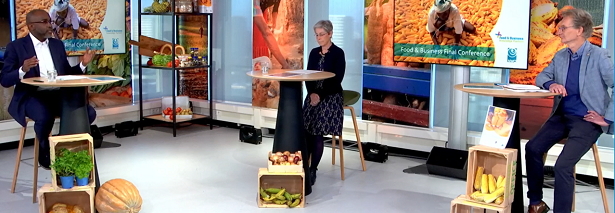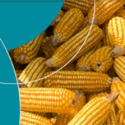Scaling Insights for Sustainable Food Systems: Discussing outcomes of Food & Business Research

On 9 and 10 December, the Food & Business Research Final Conference “Scaling Insights for Sustainable Food Systems” took place online with participants from all over the world. The conference was organized by NWO-WOTRO and the Food & Business Knowledge Platform to enlarge the impact of the 75 Food & Business Research projects (Applied Research Fund and Global Challenges Programme), bring together insights and outcomes, and discuss implications for future Food and Nutrition Security (FNS) (research) programmes.
The Food & Business Research Programme aimed at addressing persistent food security challenges in low and middle income countries. Between 2013-2020, 75 research projects have been active in Africa, South-East Asia and Latin America. All projects have been executed by consortia with stakeholders from research, practice and policy of both the South and North. To reflect on and evaluate the programme and projects, a two-day conference was organized which included two keynotes, a broad range of parallel sessions, a PhD Impact award and much more.
Politics of food systems and parallel sessions
The first day hit of with Frans Verberne (Director of the Food & Business Knowledge Platform, transferring into the Netherlands Food Partnership) and Marja Spierenburg (Professor in the Anthropology of Sustainable Development and Livelihoods), who shared their experiences with the programme since the start. When the programme started back in 2013 they were both very enthusiastic, especially because of the set-up: the programme was demand driven, focused on co-creation and reaching impact, offered space to multi-stakeholder and transdisciplinary research and collaboration with the private sector. The programme resulted in farmers adopting innovation, implementing solutions and influencing policy and regulation. In the forthcoming year spinoffs of the programme are expected, such as new research and even more implementation.
Melissa Leach, Director of the Institute for Development Studies (IDS), provided a thought provoking key note on why and how politics matter in food systems transformations. She explained how different approaches to understand power dynamics within food systems can shape interventions in policy and practice to transform these food systems. As a result, it also shapes who benefits from the interventions. Leach also underlined the increasing clustering of power in corporations within food systems, and how that at times is intertwined with interests of governmental elites. She expressed how advocacy movements are increasingly limited in space, but that activists and advocacy campaigns should built on understanding, which can be provided by research. Also researchers themselves need to take a stance on ideological positions. Melissa further congratulated NWO-WOTRO and all involved stakeholders on an incredible set of projects that are locally contextualized, embedded and grounded.
The programme was followed by two rounds of parallel sessions, that were organized by groups of research consortia in collaboration with stakeholders from policy and practice. In a session on fish feed it was discussed that the tension between export of fish and use for fish feed offers a danger to fish for food. Another session provided evidence on the role of risk and financial constraints in the promotion and upscaling climate smart agriculture (CSA) practices among smallholders. A session on dairy discussed the increased demand for dairy products and its implications for smallholders. Concluded was that the most promising message to farmers for up taking climate smart dairy practices is that feeding dairy cows with fodder reduces carbon footprint. Other sessions concluded that there is a need to understand research projects as part of wider ongoing transformations. To support scaling of the research project, longer programmes with consistent project financing are needed. Lastly, when scaling you have to be aware that there will be trade-offs, there are hardly ever win-win situations.
During a session of Syspons, who evaluate the whole Food & Business Research, it became clear that with its unique set up both ARF and GCP are mostly effective, meaning that most outcomes are reached across the programmes. Farmers and other producers adopt and apply new knowledge and innovation, and the agricultural innovations, insights and methods are being tested and further developed in an iterative manner.
Knowledge for food and nutrition security and PhD Impact Award
The second day started with a keynote by Sietze Vellema (Associate Professor at the Knowledge, Technology and Innovation group of the Wageningen University) entitled “Making knowledge relevant for food and nutrition security – reflections and ways forward”. During his keynote he discussed the role of research in transforming food systems by reflecting on the Food & Business Research programme. He questioned what the role of researchers is and should be; offer the solutions, or create a decision space? And what is the best approach for research to have impact? Scale micro interventions or find the right point in the institutional system to start addressing?
His keynote was supported by a video wherein a number of projects shared how knowledge and/or practices led to innovation in the project, and how the innovation then led to a transformation in the food system. An example is by the project on agroecological food resources for healthy infant nutrition in Benin, that developed nutritious infant food based on local resources, which resulted in more recognition of local food resources by communities and government.
With the questions of Sietze Vellema in the back of the mind of the participants, the final round of parallel sessions started. One session showed that focusing on local foods and thereby local production can have a large impact on healthy diets and nutritional status. A session on scaling CSA in Eastern and Southern Africa addressed the complexity of scaling but also the huge impact it can have on resilient food systems. During the session on politics and power in food systems it was concluded that a system’s approach requires analysis and understanding, both formal (research) and informal (personal contact).
Wijnand van Ijssel (Policy officer at Dutch Ministry of Foreign Affairs) and José Vogelzang (Scientific director TKI Horticulture and Starting Materials) evaluated the overall results of the programme, stressing that co-creation has proven to be the way forward. With all perspectives brough in everybody is better off and it enhances the sustainability of interventions. The programme has shown that all different forms of collaboration (beta-gama, public-private, North-South) is an essential element for the effectiveness of the projects and their innovations. Thereby, to start in the Applied Research Fund with local practitioners who based the problem identification on the local context is an innovative and interesting approach.
The programme closed off with a PhD Impact Award where PhD students pitched ideas to turn research results into a practical and positive impact on FNS. Winner of the award was Lestari Lakhsmi Widowati from Indonesia with her idea to create a learning platform and customize online application to reach farmers more efficiently to improve sustainable shrimp production.
After movie
This short video gives an impression of the 2 days of the Food & Business Research Final Conference ‘Scaling Insights for Sustainable Food Systems’.
_ _ _
The final conference was the closing event of the Food & Business Research Programme. All in all it showed that over the last 7 years, all project achieved incredible results on a local, but also regional and national levels. Stakeholders of all project are invited to jointly build further on these results with the Netherlands Food Partnership.






